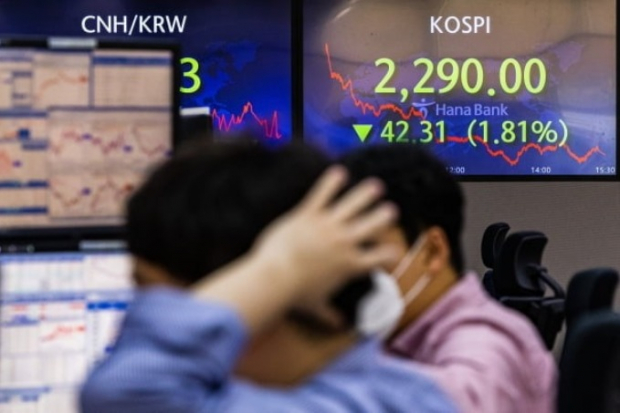Korean stock market
Korea's Kospi plunges to year's record low close on foreign selling
Foreigners have sold a net $1.9 billion since the start of September, focused on dumping battery stocks
By Sep 25, 2022 (Gmt+09:00)
3
Min read
Most Read
LG Chem to sell water filter business to Glenwood PE for $692 million


Kyobo Life poised to buy Japan’s SBI Group-owned savings bank


KT&G eyes overseas M&A after rejecting activist fund's offer


StockX in merger talks with Naver’s online reseller Kream


Mirae Asset to be named Korea Post’s core real estate fund operator



South Korea’s main bourse Kospi dropped 1.81% to finish at 2,290.00 on Sept. 23, hitting a new low closing for the year amid growing woes over central banks’ rate hikes and the US dollar’s rally.
The Kospi fell below 2,300.00 for the first time in two months. The main bourse plunged to 2,285.71 during the day, near the year’s lowest point of 2,276.63 on July 4.
The secondary bourse Kosdaq also declined 2.94% to 728.36 on Friday.
Foreign investors dumped a net 194 billion won ($136.3 million) in stocks on Seoul’s main bourse and a net 491.2 billion won on Kospi 200 futures contracts. Institutional investors sold a net 250.8 billion won of Kospi shares, while individuals purchased a net 430.9 billion won of main bourse shares.
The Korean stock market has been heavily impacted as the US Federal Reserve and central banks of the UK, Switzerland, Norway, Taiwan and Indonesia raised interest rates. As the Bank of Korea (BOK) signaled another 50-basis-point policy interest rate hike on Sept. 22, market sentiment dampened even more.
“The Kospi reflected forecasts that the price-to-earnings (P/E) ratio will continue to drop with companies’ sluggish earnings amid a global recession,” said Mirae Asset Securities analyst Park Kwang-nam. “If the main bourse falls below the lowest level of the year, it will further dampen market sentiment,” Park added.
FOREIGNERS TURN NET SELLERS
More foreigners are fleeing the Korean stock market due to the strong US dollar and increasing interest rates. According to Korea Exchange (KRX), foreign investors have sold a net of 2.117 trillion won and 658.1 billion won of stocks on the Kospi and Kosdaq, respectively, since the start of September.
As the won currency weakened past the 1,400 per dollar level for the first time since the 2008-09 global financial crisis, it is driving more foreign investors away from the Korean market. While the US benchmark interest rate rose to 3.00-3.25% per year due to a hike this month, Korea remains at 2.50%.
The Kospi fell more than other major Asian countries’ stock markets. Compared with Korea’s 1.81% drop, Japan’s Nikkei 225 and Taiwan’s Taiex fell 0.58% and 1.16%, respectively.
KOSPI LIKELY TO FALL TO 2,200.00 IN H2
According to experts, as Tesla Inc. announced in early September that it has shortened delivery waiting times for Model 3 and Model Y cars in China to a maximum of 14 weeks, it has increased concerns on slashed demand for secondary batteries, and thus impacted Korea's major battery stocks.
EV battery maker LG Energy Solution Ltd. plummeted 5.73% on Friday. Secondary batteries material firms Samsung SDI Co. and EcoPro BM Co. dropped 3.02% and 6.30%, respectively.
Foreigner sell-offs also focused on secondary batteries on Friday – they sold a net 85.7 billion won and 56.1 billion won in stocks of L&F Co. and EcoPro BM, respectively. Foreign investors also dumped a net 21.8 billion won and 12.9 billion won, respectively, in stocks of LG Energy Solution and EcoPro, a battery material maker that split EcoPro BM off in 2016.
“Inflation in the auto market, or carflation, has come to the end,” said Samsung Securities analyst Yim Eun-young. “The European EV market has declined since June although the market in China and the US are still growing fast,” Yim said.
Some analysts said the Kospi is highly likely to fall to 2,200.00, breaking through this year’s trough, due to the strong US dollar and signals of the recession deepening in the second half.
The main bourse could fall to 2,200.00 as macroeconomic factors are worse than in July, Korea Investment & Securities analyst Kim Dae-jun said. Kospi’s support line will be around 2,200.00 in the second half if the US stock market remains stable, said Samsung Securities senior research analyst Jeong Myung-ji.
Write to Tae-Ung Bae at btu104@hankyung.com
Jihyun Kim edited this article.
More to Read
-
 Korean stock marketForeign stock buying on weaker won: Bucking the trend?
Korean stock marketForeign stock buying on weaker won: Bucking the trend?Aug 25, 2022 (Gmt+09:00)
3 Min read -
 MarketsSell Korea intensifies as foreigners dump bonds for 1st time in 18 months
MarketsSell Korea intensifies as foreigners dump bonds for 1st time in 18 monthsJul 11, 2022 (Gmt+09:00)
3 Min read -
 Korean stock marketForeign ownership of S.Korean stocks at 13-year low
Korean stock marketForeign ownership of S.Korean stocks at 13-year lowJun 21, 2022 (Gmt+09:00)
3 Min read -

-
 Korean stock marketKospi in lethargic trade ahead of LG Energy debut
Korean stock marketKospi in lethargic trade ahead of LG Energy debutJan 18, 2022 (Gmt+09:00)
2 Min read
Comment 0
LOG IN


